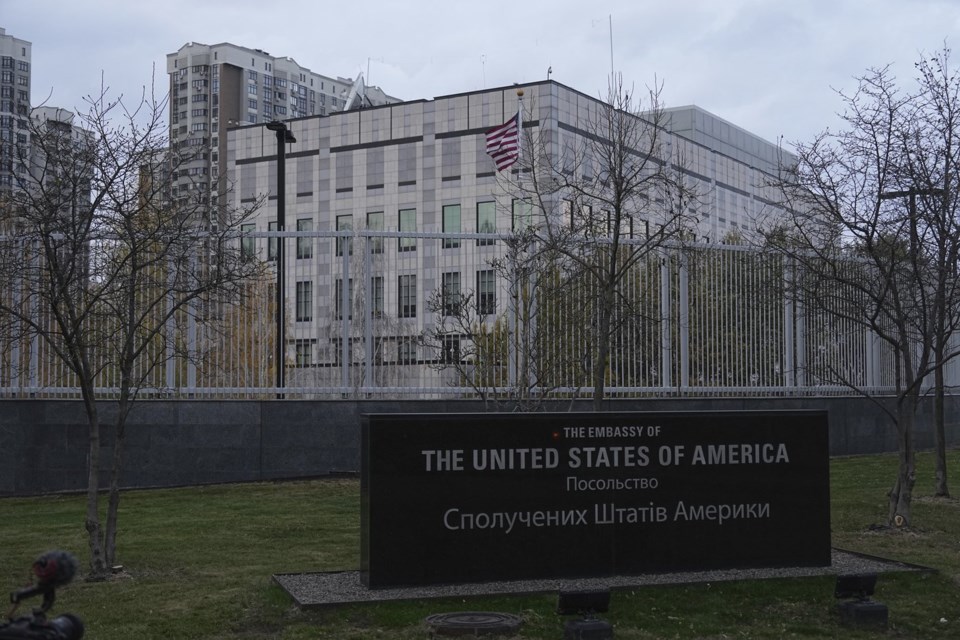OTTAWA — The Canadian and American embassies in Ukraine were closed to the public on Wednesday after the U.S. warned of a "potential significant air attack" in Kyiv by Russia.
However, Ukraine's intelligence agency posted a statement that urged people not to panic and accused Russia of spreading fake messages about the threat of an "extremely massive" attack on Ukrainian cities.
The U.S. Embassy in Kyiv said in a message on its website that it had received specific information about a possible attack and, out of an abundance of caution, employees were sheltering in place and the embassy was closed.
In a media release later on Wednesday, the embassy said it had modified operations and was open and operational.
In-person consular services at the Canadian Embassy have been suspended since the full-scale invasion began in 2022. On Wednesday, officials said the embassy was closed to staff as well, as a result of the possible threat of air strikes.
Ukraine used U.S.-supplied missiles to strike inside Russia for the first time this week, a move the Kremlin said added "fuel to the fire" of the war.
U.S. President Joe Biden gave the green light for Kyiv to strike Russian targets and to use antipersonnel landmines, as part of a larger effort to bolster Ukraine's defences before Donald Trump takes over the White House in January.
Trump and his allies have been critical of American funding for Ukraine, stoking fears the president-elect could cut off supplies to the embattled country.
Prime Minister Justin Trudeau told reporters this week that he has long called for allies to give Ukraine permission to strike Russian military targets.
"I have, for months now, talked about how important it is to degrade the capacity of the Russian military to strike into Ukraine with impunity because Ukraine hasn't been able to strike on factories and military production sites in Russia," he said at a press conference in Rio de Janeiro on Tuesday.
Canada opposes the use of landmines, however, and was instrumental in the creation of an international treaty in 1999 that agrees to ban the weapons. The U.S. and Russia have not signed on to the Ottawa Convention.
Former Liberal foreign minister Lloyd Axworthy released a statement Wednesday panning the Biden administration's decision to approve landmine use, saying it sends a troubling message to the international community and emboldens other states to disregard the treaty.
"All state parties must take a firm stand. We cannot remain silent," Axworthy said in the statement, which included comments by Anne Delorme, executive director of Humanity and Inclusion Canada.
A spokesperson for the office of Foreign Affairs Minister Mélanie Joly said Canada is aware of the U.S. decision to allow landmines to be used.
"Our support for the Ottawa Convention, trailblazed by former minister Lloyd Axworthy, remains unchanged and we will continue to defend it," Joly's office said in a statement.
"Canada continues to support demining efforts around the world, including in Ukraine."
Trudeau and Biden discussed the defence of Ukraine in a bilateral meeting this week at the G20 leaders' summit.
Trudeau was critical of the G20's final statement, saying it was not strong enough in its support of Ukraine. Russia is a member of the G20 and this year's statement from the leaders did not mention Russia at all.
The BBC reported Wednesday that missiles supplied by the U.K. have also been used inside Russia for the first time since the conflict began more than 1,000 days ago.
The Biden administration's move is being seen as an escalation in Moscow.
Asked Tuesday whether a Ukrainian attack with longer-range U.S. missiles could potentially trigger the use of nuclear weapons, Kremlin spokesman Dmitry Peskov answered affirmatively.
This report by The Canadian Press was first published Nov. 20, 2024.
— With files from Dylan Robertson and The Associated Press
Sarah Ritchie, The Canadian Press



